Module 5 Lao She's Teahouse. Unit 2 It describes the changes in Chinese society 课件
文档属性
| 名称 | Module 5 Lao She's Teahouse. Unit 2 It describes the changes in Chinese society 课件 |
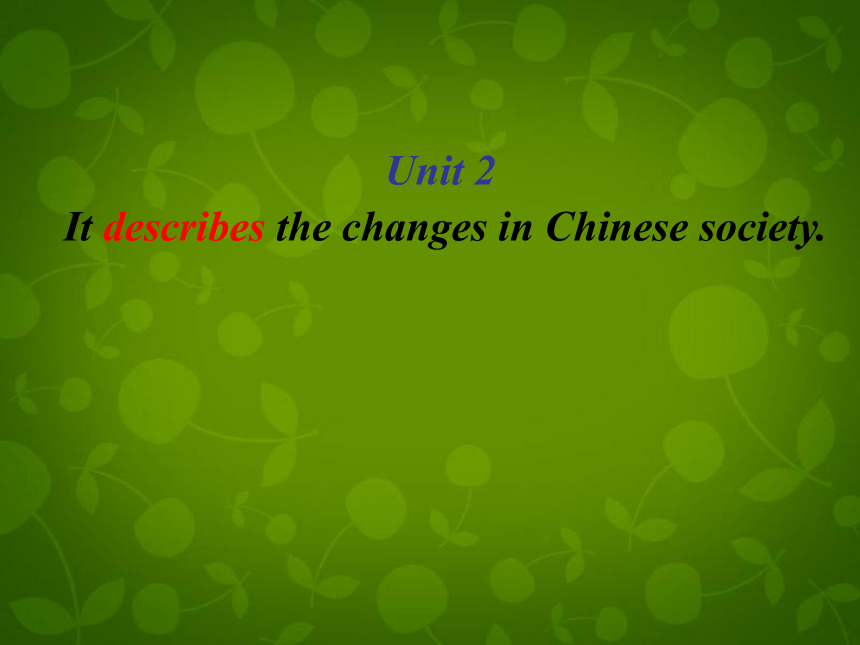
|
|
| 格式 | zip | ||
| 文件大小 | 6.2MB | ||
| 资源类型 | 教案 | ||
| 版本资源 | 外研版 | ||
| 科目 | 英语 | ||
| 更新时间 | 2015-08-21 19:53:06 | ||
图片预览

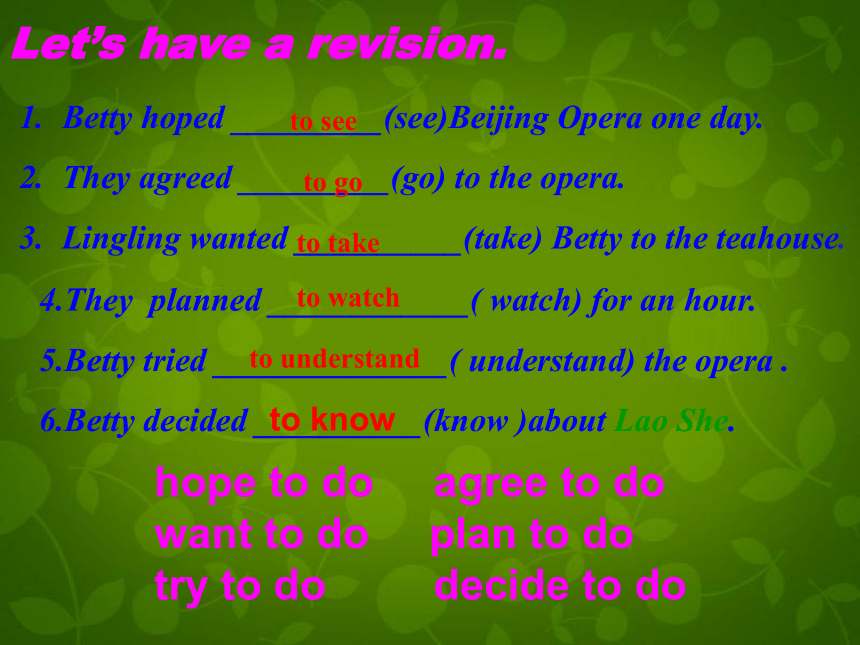

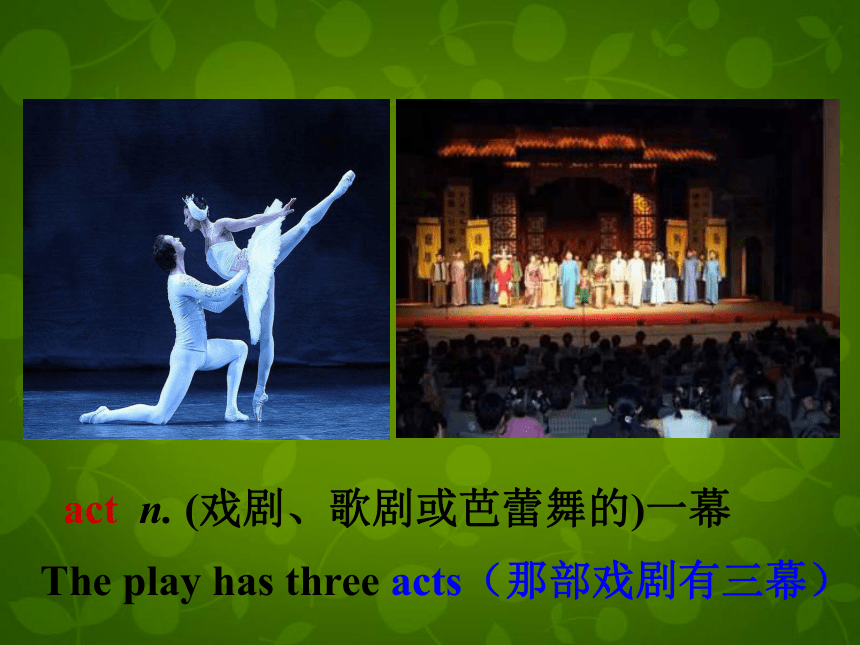
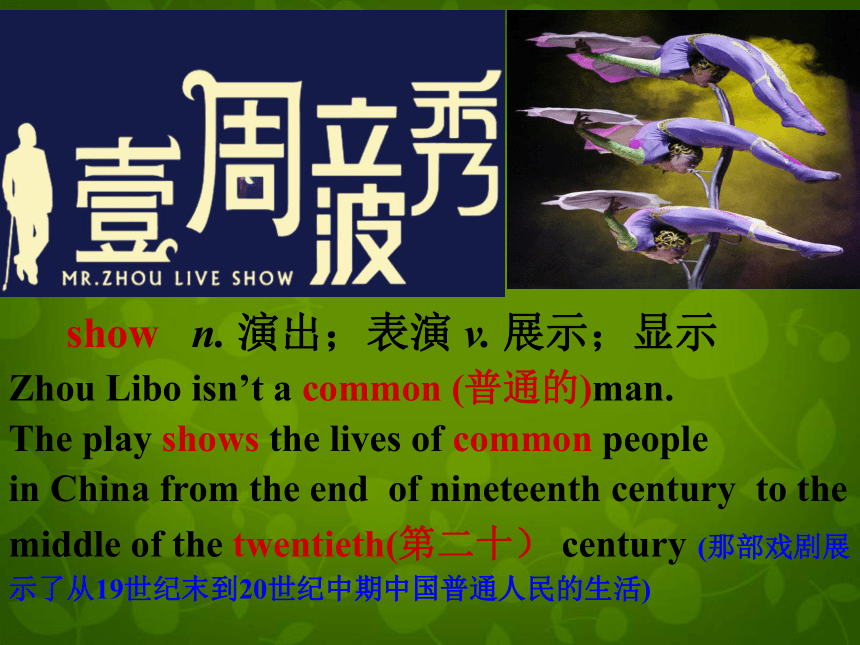
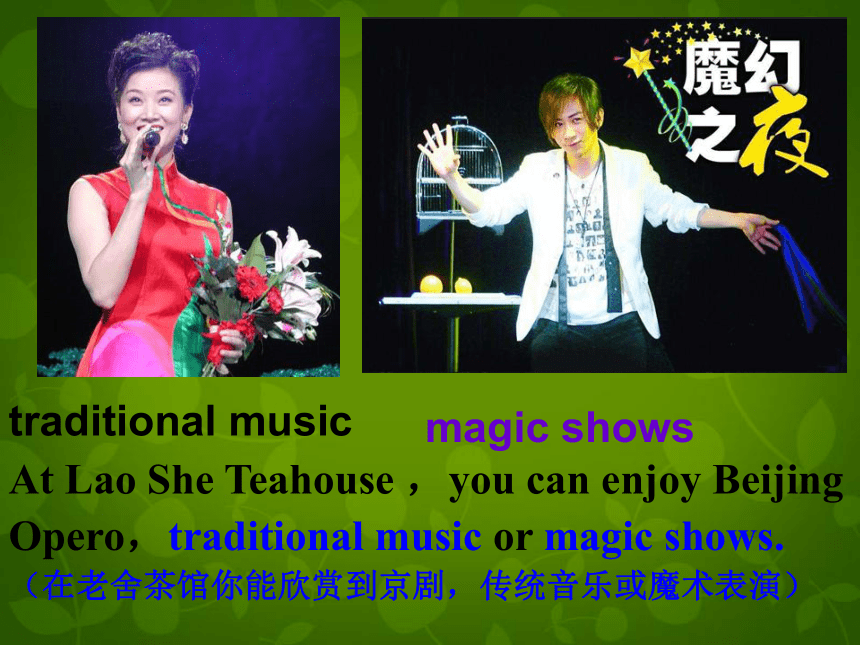
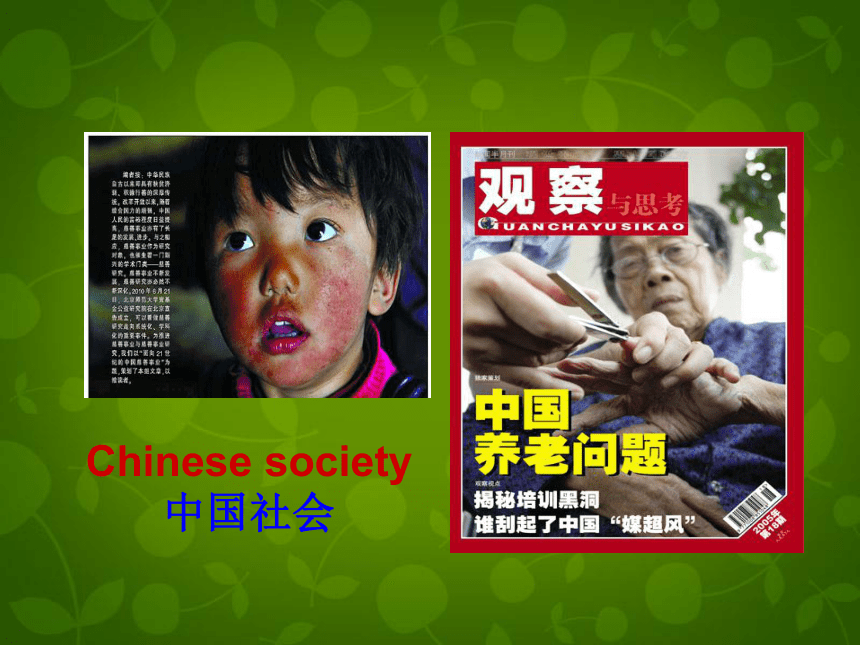
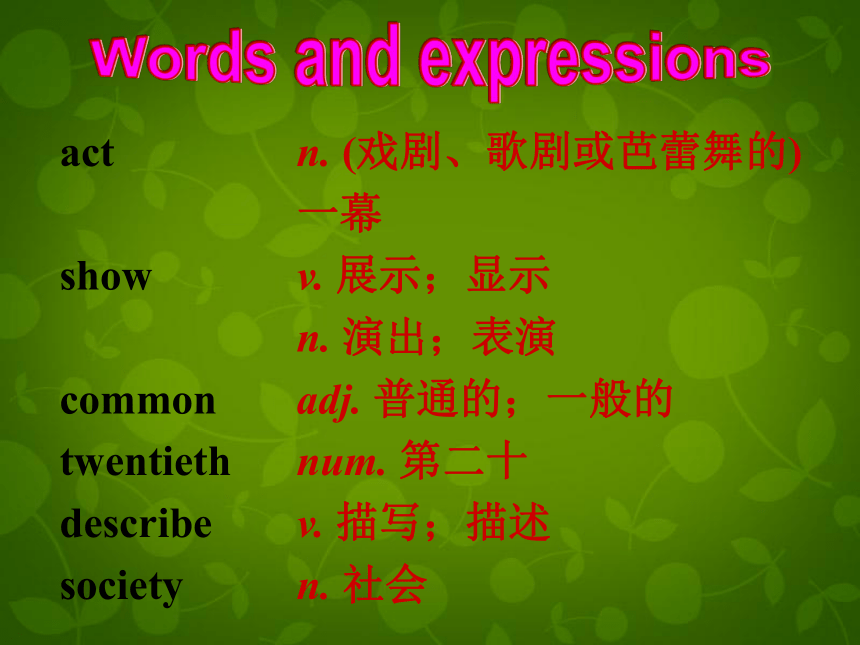
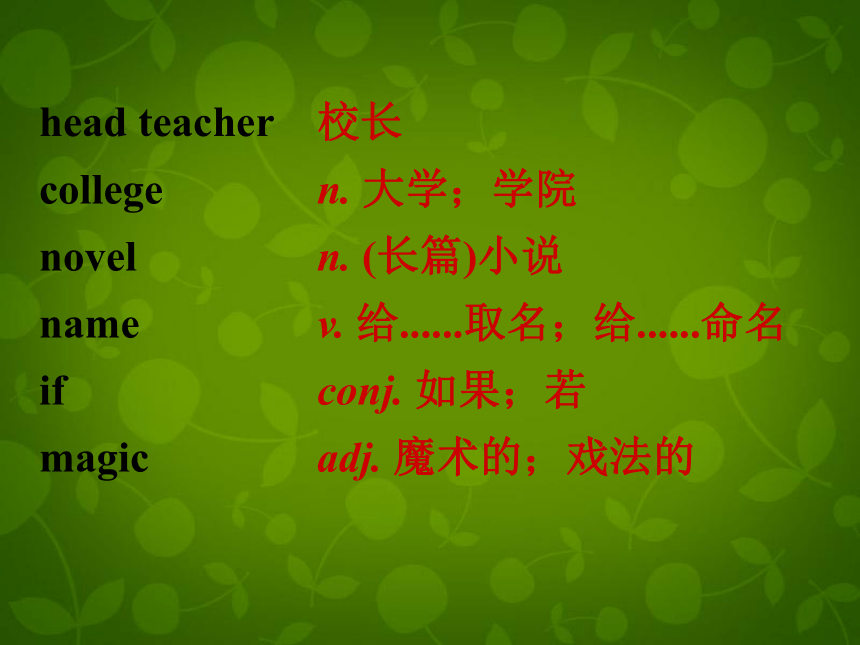
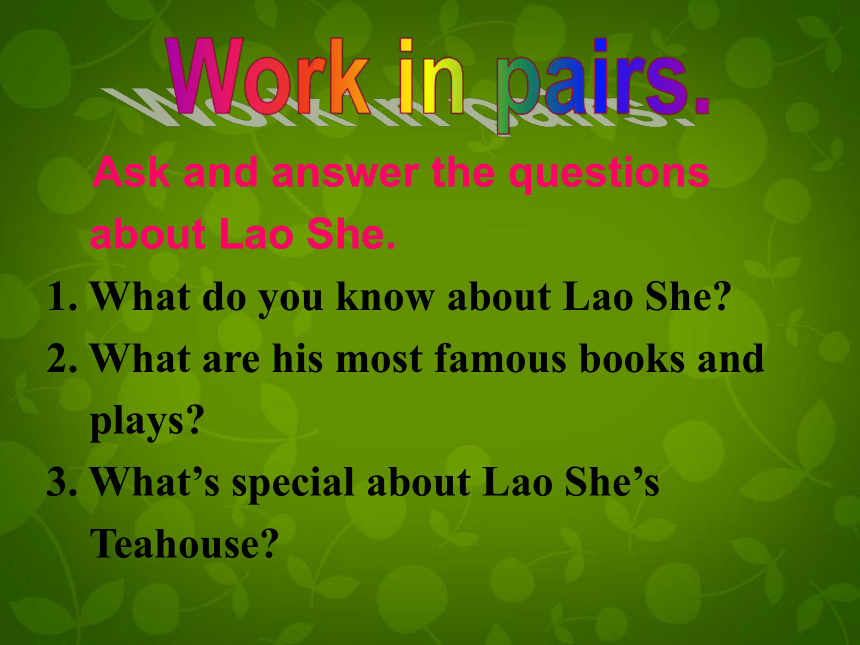
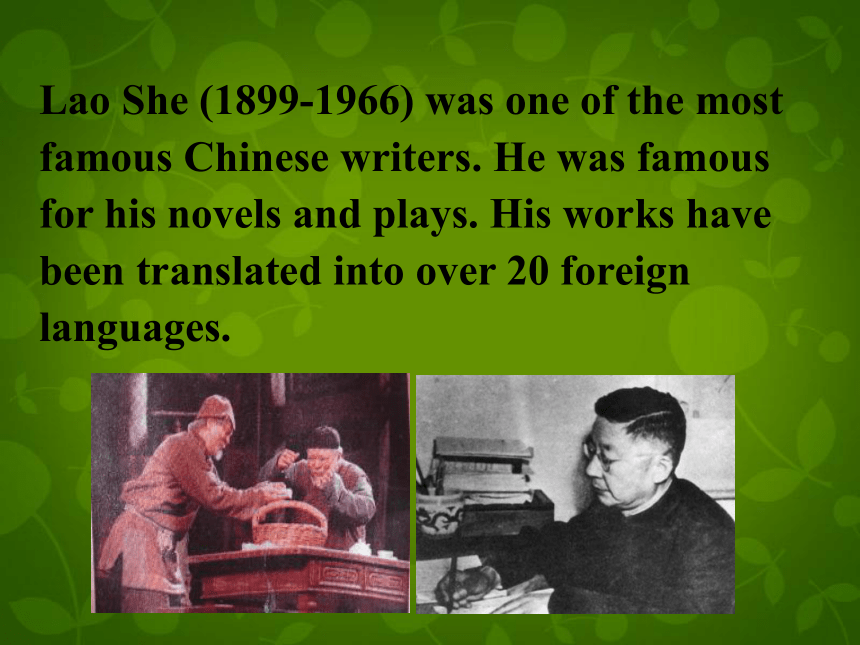

文档简介
课件32张PPT。Unit 2
It describes the changes in Chinese society. Let’s have a revision.Betty hoped _________(see)Beijing Opera one day.
They agreed _________(go) to the opera.
Lingling wanted __________(take) Betty to the teahouse.4.They planned ____________( watch) for an hour.
5.Betty tried ______________( understand) the opera .
6.Betty decided __________(know )about Lao She.
to seeto go to taketo watchto understandto knowhope to do agree to do
want to do plan to do
try to do decide to do Look and say.customerLao She’s TeahouseAt Lao She Teahouse ,customers can drink
tea and eat delicious Beijing food.act n. (戏剧、歌剧或芭蕾舞的)一幕The play has three acts(那部戏剧有三幕)show n. 演出;表演 v. 展示;显示 Zhou Libo isn’t a common (普通的)man.
The play shows the lives of common people
in China from the end of nineteenth century to the middle of the twentieth(第二十) century (那部戏剧展示了从19世纪末到20世纪中期中国普通人民的生活)
traditional music magic shows At Lao She Teahouse ,you can enjoy Beijing
Opero,traditional music or magic shows.
(在老舍茶馆你能欣赏到京剧,传统音乐或魔术表演)
Chinese society
中国社会 act
show
common
twentieth
describe
societyWords and expressionsn. (戏剧、歌剧或芭蕾舞的)一幕
v. 展示;显示
n. 演出;表演
adj. 普通的;一般的
num. 第二十
v. 描写;描述
n. 社会head teacher
college
novel
name
if
magic校长
n. 大学;学院
n. (长篇)小说
v. 给......取名;给......命名
conj. 如果;若
adj. 魔术的;戏法的Work in pairs. Ask and answer the questions about Lao She.
1. What do you know about Lao She?
2. What are his most famous books and plays?
3. What’s special about Lao She’s Teahouse?Lao She (1899-1966) was one of the most famous Chinese writers. He was famous for his novels and plays. His works have been translated into over 20 foreign languages.Listen and readLearning to learn When you read a passage, remember to look at its title, the paragraph headings and the photos if there are any. They will help you understand the main ideas.Read the passage and match the headings with the paragraphs. Lao She Teahouse
The story of Teahouse
Lao She 1
2
32 Read Para1 and check the true sentences1.Teahouse is one of Lao She’s most famous plays
2.The play has two acts.
3.It tells us the story of Wang Lifa and the customers of his teahouse in Shanghai.
4.It describes the changes in Chinese society
over fifty years two -threeShanghai-BeijingRead Para3 and fill in blanksAt Lao She Teahouse today ,custormers can
_____________ and __________________
You can enjoy___________ ____________
or______________ .Lao She Teahouse give
a warm welcome to everyone from_________drink teaeat delicious Beijing foodBeijing OperaTraditional musicmagic showsall over the
worldComplete the timeline with information about Lao She.______________________________________________________________________________________________________________________________________________________________________________1957
1924
1918
1913
1899 wrote Teahouse
left home and went to England
finished school and became the head teacher of a primary school
went to a teacher’s schoolborn in BeijingLao She3Complete the passage with the words in the box. Lao She’s play, Teahouse, has thre acts. It describes the life of Wang Lifa and the changes of the lives of (1) _______people in Chinese (2) ________ in the first half of the twentieth (3) ________. commonsocietycenturyActivity4
Lao She went to a teacher’s school in Beijing, taught in London and later returned to China. He is one of China’s greatest (4) ________.
Come to Lao She Teahouse in Beijing (5) ______ you like the Beijing Opera, traditional music or (6) _______ shows.writersifmagicLanguage pointsUnit 2Teahouse is one of Lao She’s most famous plays.
《茶馆》是老舍最著名的剧作之一。
one of +形容词最高级+名词复数,表“……中的一个”
名词复数
One of us must go.
我们之中要走一个人。
Physics is one of the most difficult subjects.
物理是最难的学科之一。2. Lao She was born in Beijing in 1899.
老舍生于1899年。
表示"出生"要用be born,并且动词be通常只用was 或were 。
?born + in/on等,表示“出生的时间,地点”。?
Tom was born in Hebei Province on February 12,1999.
1999年2月12日汤姆生于河北省。? ?3. … was named “the People’s Artist”,…
(他)被誉为“人民艺术家”。
name在这里是动词,表示“命名”; name作动词还可以表示“任命”。例如:
Wang Bo was named as captain of our football team.
王波被任命为我们足球队的队长。4.Lao She Teahouse gives a wonderful welcome to everyone from all over the world.
老舍茶馆热烈欢迎来自世界各地的人们。
give (sb.) a … welcome (to…) 意为“对(某人)表示……欢迎”,其中 welcome是名词。
We gave the American teacher a warm welcome at the party.
我们在聚会上热情地欢迎美国老师(的到来)。
5. take place (有计划地)发生,举行
e.g. When did the Beijing Olympic Games take place?
动词不规则过去式:
write写 — wrote(过去式)
Send发送 – sent (send… to… 送到…)
leave离开– left( 过去式 ) left home 离开家
teach教 – taught(过去式)
像这种“动词+人+物”的结构,我们称它双宾语结构。
其中,把人称为间接宾语,把物称为直接宾语。buy sb. sth. =
cook sb. sth. =
make sb. sth. =Tell sb. sth. teach sb. sth. give sb. sth.(一)多数可以改成“动词+物+ to +人”tell sb. sth.= tell sth. to sb.
teach sb. sth. = teach sth. to sb.
give sb. sth. = give sth. to sb. Summary show sb. sth.=
bring sb. sth. =
send sb. sth. =
offer sb. sth. =
pass sb. sth. =
sell sb. sth. =
(二)少数可改成“动词+物+ for +人”
show sth. to sb.
bring sth. to sb.send sth. to sb.offer sth. to sb.
pass sth. to sb.sell sth. to sb.make sth. for sb.cook sth. for sb.buy sth. for sb.Complete the sentences.1.The waiters bring the customers some tea.2.My father gave me a red apple yesterday.3. Tony made his sister a lantern last week. 4. Jim’s father will buy him a bike next year.The waiters bring some tea to the customers.My father gave a red apple to me yesterday.Tony made a lantern for his sister last week. Jim’s father will buy a bike for him next year.Please remember them:show sb. sth. = show sth. to sb.tell sb. sth. = tell sth. to sb.teach sb. sth. = teach sth. to sb.sell sb. sth. = sell sth.to sb.bring sb. sth. = bring sth. to sb.offer sb. sth. = offer sth. to sb.buy sb. sth. = buy sth. for sb.Complete the table.It shows the lives of common people in China.In BeijingFrom the end of 19th century to the middle of the 20th centuryIt tells the changes in Chinese society over 50 years.5Write sentences about Teahouse with the information in Activity 5. Use the passage in Activity 2 to help you.The story of Teahouse takes place in Beijing.Now join the sentences. Write a passage about Teahouse.6HomeworkWrite a passage about your favorite play or film. Use Activities 5 and 6 to help you.Thank you!
It describes the changes in Chinese society. Let’s have a revision.Betty hoped _________(see)Beijing Opera one day.
They agreed _________(go) to the opera.
Lingling wanted __________(take) Betty to the teahouse.4.They planned ____________( watch) for an hour.
5.Betty tried ______________( understand) the opera .
6.Betty decided __________(know )about Lao She.
to seeto go to taketo watchto understandto knowhope to do agree to do
want to do plan to do
try to do decide to do Look and say.customerLao She’s TeahouseAt Lao She Teahouse ,customers can drink
tea and eat delicious Beijing food.act n. (戏剧、歌剧或芭蕾舞的)一幕The play has three acts(那部戏剧有三幕)show n. 演出;表演 v. 展示;显示 Zhou Libo isn’t a common (普通的)man.
The play shows the lives of common people
in China from the end of nineteenth century to the middle of the twentieth(第二十) century (那部戏剧展示了从19世纪末到20世纪中期中国普通人民的生活)
traditional music magic shows At Lao She Teahouse ,you can enjoy Beijing
Opero,traditional music or magic shows.
(在老舍茶馆你能欣赏到京剧,传统音乐或魔术表演)
Chinese society
中国社会 act
show
common
twentieth
describe
societyWords and expressionsn. (戏剧、歌剧或芭蕾舞的)一幕
v. 展示;显示
n. 演出;表演
adj. 普通的;一般的
num. 第二十
v. 描写;描述
n. 社会head teacher
college
novel
name
if
magic校长
n. 大学;学院
n. (长篇)小说
v. 给......取名;给......命名
conj. 如果;若
adj. 魔术的;戏法的Work in pairs. Ask and answer the questions about Lao She.
1. What do you know about Lao She?
2. What are his most famous books and plays?
3. What’s special about Lao She’s Teahouse?Lao She (1899-1966) was one of the most famous Chinese writers. He was famous for his novels and plays. His works have been translated into over 20 foreign languages.Listen and readLearning to learn When you read a passage, remember to look at its title, the paragraph headings and the photos if there are any. They will help you understand the main ideas.Read the passage and match the headings with the paragraphs. Lao She Teahouse
The story of Teahouse
Lao She 1
2
32 Read Para1 and check the true sentences1.Teahouse is one of Lao She’s most famous plays
2.The play has two acts.
3.It tells us the story of Wang Lifa and the customers of his teahouse in Shanghai.
4.It describes the changes in Chinese society
over fifty years two -threeShanghai-BeijingRead Para3 and fill in blanksAt Lao She Teahouse today ,custormers can
_____________ and __________________
You can enjoy___________ ____________
or______________ .Lao She Teahouse give
a warm welcome to everyone from_________drink teaeat delicious Beijing foodBeijing OperaTraditional musicmagic showsall over the
worldComplete the timeline with information about Lao She.______________________________________________________________________________________________________________________________________________________________________________1957
1924
1918
1913
1899 wrote Teahouse
left home and went to England
finished school and became the head teacher of a primary school
went to a teacher’s schoolborn in BeijingLao She3Complete the passage with the words in the box. Lao She’s play, Teahouse, has thre acts. It describes the life of Wang Lifa and the changes of the lives of (1) _______people in Chinese (2) ________ in the first half of the twentieth (3) ________. commonsocietycenturyActivity4
Lao She went to a teacher’s school in Beijing, taught in London and later returned to China. He is one of China’s greatest (4) ________.
Come to Lao She Teahouse in Beijing (5) ______ you like the Beijing Opera, traditional music or (6) _______ shows.writersifmagicLanguage pointsUnit 2Teahouse is one of Lao She’s most famous plays.
《茶馆》是老舍最著名的剧作之一。
one of +形容词最高级+名词复数,表“……中的一个”
名词复数
One of us must go.
我们之中要走一个人。
Physics is one of the most difficult subjects.
物理是最难的学科之一。2. Lao She was born in Beijing in 1899.
老舍生于1899年。
表示"出生"要用be born,并且动词be通常只用was 或were 。
?born + in/on等,表示“出生的时间,地点”。?
Tom was born in Hebei Province on February 12,1999.
1999年2月12日汤姆生于河北省。? ?3. … was named “the People’s Artist”,…
(他)被誉为“人民艺术家”。
name在这里是动词,表示“命名”; name作动词还可以表示“任命”。例如:
Wang Bo was named as captain of our football team.
王波被任命为我们足球队的队长。4.Lao She Teahouse gives a wonderful welcome to everyone from all over the world.
老舍茶馆热烈欢迎来自世界各地的人们。
give (sb.) a … welcome (to…) 意为“对(某人)表示……欢迎”,其中 welcome是名词。
We gave the American teacher a warm welcome at the party.
我们在聚会上热情地欢迎美国老师(的到来)。
5. take place (有计划地)发生,举行
e.g. When did the Beijing Olympic Games take place?
动词不规则过去式:
write写 — wrote(过去式)
Send发送 – sent (send… to… 送到…)
leave离开– left( 过去式 ) left home 离开家
teach教 – taught(过去式)
像这种“动词+人+物”的结构,我们称它双宾语结构。
其中,把人称为间接宾语,把物称为直接宾语。buy sb. sth. =
cook sb. sth. =
make sb. sth. =Tell sb. sth. teach sb. sth. give sb. sth.(一)多数可以改成“动词+物+ to +人”tell sb. sth.= tell sth. to sb.
teach sb. sth. = teach sth. to sb.
give sb. sth. = give sth. to sb. Summary show sb. sth.=
bring sb. sth. =
send sb. sth. =
offer sb. sth. =
pass sb. sth. =
sell sb. sth. =
(二)少数可改成“动词+物+ for +人”
show sth. to sb.
bring sth. to sb.send sth. to sb.offer sth. to sb.
pass sth. to sb.sell sth. to sb.make sth. for sb.cook sth. for sb.buy sth. for sb.Complete the sentences.1.The waiters bring the customers some tea.2.My father gave me a red apple yesterday.3. Tony made his sister a lantern last week. 4. Jim’s father will buy him a bike next year.The waiters bring some tea to the customers.My father gave a red apple to me yesterday.Tony made a lantern for his sister last week. Jim’s father will buy a bike for him next year.Please remember them:show sb. sth. = show sth. to sb.tell sb. sth. = tell sth. to sb.teach sb. sth. = teach sth. to sb.sell sb. sth. = sell sth.to sb.bring sb. sth. = bring sth. to sb.offer sb. sth. = offer sth. to sb.buy sb. sth. = buy sth. for sb.Complete the table.It shows the lives of common people in China.In BeijingFrom the end of 19th century to the middle of the 20th centuryIt tells the changes in Chinese society over 50 years.5Write sentences about Teahouse with the information in Activity 5. Use the passage in Activity 2 to help you.The story of Teahouse takes place in Beijing.Now join the sentences. Write a passage about Teahouse.6HomeworkWrite a passage about your favorite play or film. Use Activities 5 and 6 to help you.Thank you!
同课章节目录
- Module 1 How to learn English
- Unit 1 Let's try to speak English as much as possi
- Unit 2 You should smile at her.
- Unit 3 Language in use .
- Module 2 My home town and my country
- Unit 1 It's taller than many other buildings.
- Unit 2 Cambridge is a beautiful city in the east o
- Unit 3 Language in use .
- Module 3 Sports.
- Unit 1 Nothing is more exciting than playing tenni
- Unit 2 This year we training more carefully.
- Unit 3 Language in use .
- Module 4 Planes, ships and trains .
- Unit 1 He lives the farthest from school.
- Unit 2 What is the best way to travel.
- Unit 3 Language in use .
- Module 5 Lao She Teahouse.
- Unit 1 I wanted to see the Beijing Opera.
- Unit 2 It descibes the changes in Chinese society.
- Unit 3 Language in use .
- Module 6 Animals in danger.
- Unit 1 It allows people to get closer to them .
- Unit 2 The WWF is working hard to save them all.
- Unit 3 Language in use .
- Revision module A
- Module 7 A famous story
- Unit 1 Alice was sitting with her sister by the ri
- Unit 2 She was thinking about her cat.
- Unit 3 Language in use .
- Module 8 Accidents
- Unit 1 While the car were changing to red, a car s
- Unit 2 I was trying to pick it up when it bite me
- Unit 3 Language in use .
- Module 9 Population
- Unit 1 The population of China is about 1.37 billi
- Unit 2 Arnwick was a city with 200,000 people.
- Unit 3 Language in use .
- Module 10 The weathe
- Unit 1 It might snow.
- Unit 2 The weather is fine all year round.
- Unit 3 Language in use .
- Module 11 Way of life
- Unit 1 In China ,we open a gift later.
- Unit 2 In England, you usually drink tea with milk
- Unit 3 Language in use .
- Module 12 Help
- Unit 1 What should we do before help arrives?
- Unit 2 Stay away from windows and heavy furniture.
- Unit 3 Language in use .
- Revision module B
